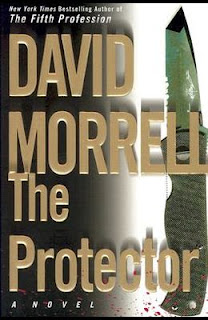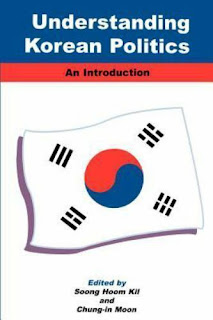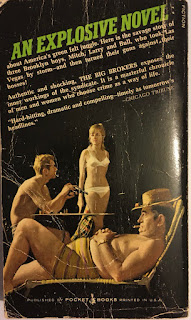 |
| Kudos to a cover that shows an actual scene from the book |
Monday, May 30, 2022
24. The Feud by Thomas Berger
Wednesday, May 25, 2022
23. The Protector by David Morrell
Morrell seems to have made a niche for himself as extreme researcher of cool ass shit. In this case, he goes deep on the elite protection industry. Cavanaugh is an ex-Navy Seal who runs a small team that protects and hides people under extreme threat. Here, he is hired to protect a scientist who is already holed up in a warehouse hideout. When he goes there, the shit hits the fan and Cavanaugh learns that the guy discovered the ultimate drug (instantly addictive) and that the cartel is after him. There are several twists that weren't too hard to predict (even too easy, at a couple of points I found Cavanaugh to be stupid to not cotton to what was going on), that of course lead to Cavanaugh on his own, on the run.
There was another early plot point error that surprised me, where they sent the client out to get his fake ID created before the plastic surgery they were planning and I was off on the wrong foot. Once we get into the main plot, it's pretty cool. Morrell's research comes into play and we get lots of cool techniques for going undercover on the lam, armouring vehicles (and how to knock other vehicles off the road), making fake wounds and all kinds of cool little details. The bad guy is a real hateful prick too. A bit shakey at the beginning but ended up being as I had expected a quick fun read.
Monday, May 23, 2022
22. Understanding Korean Politics: an Introduction edited by Soong Hoom Kil and Chung-in Moon
I think it is probably worth studying why Korea has remained so quiet in the west, considering that it's history is quite wild. Not only did it have a miraculous economic growth, it did so through three dictatorships and some serious political craziness (including the president being assassinated by the head of the Korean CIA in 1987!). Why does Korea get so little play in the west? This book did not go into that, but it was a solid and sometimes interesting overview of Korea's political history, coming out of WWII being basically occupied by the US and USSR, getting split after the Korean War and then developing from a US-dependent military dictatorship to an independent, democratic economic powerhouse.
Though a bit dry and basically undergrad poli-sci with some of the nonsense that brings (academics still struggle with arguing over which theoretical lens is best and then concluding oh yeah we can use many), this book was divided into digestible chapters, all of which were really well-researched and directly presented. What I found particularly interesting is how the dictatorships had such control until, in each case, they went too far and popular protest ended up bringing them down. I'm over-simplifying but there seems to be something in 20th century Korean history where the people are unified enough (and having the threat of North Korea is a major factor here) that they can exist with a dictatorship and yet also bring it down. It bums me out that in their last election, they chose a populist asshole (though barely, but isn't that how these fucks get in power everywhere?). I hope Korean cultural and political unity can withstand the dividing power of today's internet.
Monday, May 16, 2022
21. The Lottery: Adventures of the Daemon Lover by Shirley Jackson
An aside, reading this book did just give me a clear notion of the definition of "genre". This is my own way of understanding it (and may well be utterly not original and probably thought over with much more depth by much smarter and more patient people). Basically, in genre fiction, the primary objective is to tell a story. Ideas and concepts are delivered with the story, but tend to not be the main focus. Literary fiction can be story-driven but generally it is the ideas and concepts that are the main objective. Obviously there is a spectrum and lots of exceptions but broadly speaking this is why I personally prefer genre fiction.
The above notion crystallized in me while reading these short stories because many of them have only the most minimal story structure. At first, I was mildly annoyed, because despite my objective tone above, I am really not down with the New Yorker/liberal arts university creative writing course mode of trying to impart a feeling or some shit. However, Jackson is such a skilled writer and the stories so tight and short (and effective) that I got over my irritation. Many of the stories deal with the anxiety of women in this time period in the northeast, usually with an absent or oblivious husband and a contrast between the city and the country. There are a couple of stories here that really capture the fear that New Yorkers have of the country and close proximity to the rural working class. This has been going on for a long time!
My favourite story is The Dummy about two catty women who see a ventriloquist show and react to the dummy. Really, nothing much happens, almost the small incident one might see going out in NYC that would be a funny anecdote, but it made me laugh and she captures the women's dialogue so well.
I'm glad I read this (and later read up on Jackson's life) because I had only read The Haunting of Hill House, which is good but doesn't give you a good sense of where she is coming from. I will have a better appreciation of her work now.
Friday, May 13, 2022
20. Planet in Peril by John Christopher
The story is that the hero after years working quietly in the same lab, suddenly gets transferred and promoted to a location where his predecessor disappeared in a sailing accident. When he gets to the new office, he meets the resentful assistant, who is also attractive and they hit it off. Then there is a lot of intrigue that you really don't care about, culminating in the possibility of Siraq invading the rest of the world with flying soldiers using heat rays generated from a new diamond energy that only the protagonist was somehow capable of inventing (except the Siraqis already invented).
There were a couple of good bits, such as the airspheres, giant bubbles you can fly around in the clouds, which was very well described and enjoyable to visualize. There are nice, subtle descriptive moments that remind you what a good writer Youd was. Overall, though, a dud.
Friday, May 06, 2022
19. The Big Brokers by Irving Shulman
The premise is great. Three young toughs (and one's moll) are sent by their boss to take over a failed resort and casino investment in Las Vegas. They proved themselves well on the streets to their boss, kindly but tough and scheming Itzik Yanowitz (a great character!) but it is a bit of a stretch and a risk to ask them to take over a hotel where the previous scrammed with the money and left to ruin. The book has an interesting pattern of weaving between sections of great detail, focusing on getting the casino set up for instance, then accelerating ahead to the next phases and challenges in their existence. It makes it somewhat uneven in feeling. Is it a procedural or an epic? In the end, it goes for the latter and I have to say does also succeed in giving us a lot of really entertaining procedure, both with how the criminals work and how a resort casino was run in that period.
Another element that makes the book somewhat uneven is the writing style. It's not bad, actually quite readable and the content is so rich that I found myself easily turning the pages. Shulman jumps around from perspective, not just from the characters' minds but going from a detailed description of the muscles on their faces to their thoughts and then to a more objective perspective. It also gets a bit melodramatic and maudlin at times. He really bears down on the stress and anxiety and the generally unpleasant price one pays to avoid the rat race and live large as a gangster. It gets rough at times too, there are two particularly brutal beatings that are hard to read.
It's interesting to read this book written in 1959, written 10 years before The Godfather and yet containing so much material that is now considered the sole domain of Scorsese. I wonder if he read this book, because half of Casino is in here. This one is going on the book shelf.










